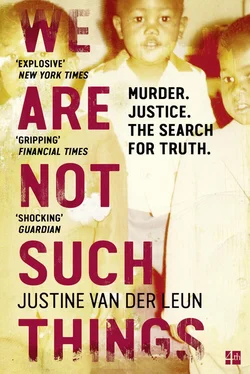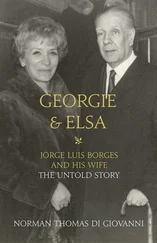When I started my work, I didn’t understand the complexities of the Truth and Reconciliation Commission, or of South Africa, or, I suppose, of true-life stories in general. I assumed there were clear-cut narratives in the country, with good and bad protagonists and antagonists, and that I would simply tell one of them. But as the Johannesburg-born journalist Rian Malan wrote, “In South Africa, it’s like a law of nature: there’s no such thing as a true story here. The facts might be correct, but the truth they embody is always a lie to someone else … Atop of all this, we live in a country where mutually annihilating truths coexist amicably. We are a light unto nations. We are an abject failure. We are progressing every day as we hurtle backward.”
Early on, I became convinced, naively, that with enough frenzied effort, I could find the Big Truth about the Amy Biehl story. I was after the objective truth: that elusive creature, a forensic reality that conformed to proven or provable facts, something mathematical and scientific and doubtless. But Easy, the man who over the years brought me closest to this truth and led me farthest from it, broke it down for me.
We were sitting across from each other at a linoleum table at the Hungry Lion fast food establishment in downtown Cape Town. Easy was wearing his buttercup-yellow Paul Smith polo, which he bought from a Nigerian who dealt in cut-rate fine garments, which were either stolen or counterfeit, it was hard to tell. He was drinking a ginger soda and I was spitting questions at him.
Months earlier, Easy had christened me Nomzamo, a Xhosa name. All Xhosa names have literal meanings that are reflections of a person’s character or the hopes of the parent for the child. Nomzamo comes from the Xhosa word zama , “to try.” It can be interpreted as “she who strives and perseveres” or, probably, in my case, “pain in the ass.” Easy had explained it as: “You always try, try, try. It’s a good name.”
“What do you really want to know?” he finally asked, looking at me with a mixture of compassion and bewilderment. He was wiping the grease from his fingers onto a paper napkin.
“I want to know the truth!” I exclaimed.
Easy studied me for a moment and then broke into guttural laughter.
“Nomzamo, Nomzamo, Nomzamo,” he said. “The truth is not anymore existing for years and years.”
He who fights with monsters should be careful lest he thereby become a monster.
—FRIEDRICH NIETZSCHE
Конец ознакомительного фрагмента.
Текст предоставлен ООО «ЛитРес».
Прочитайте эту книгу целиком, купив полную легальную версию на ЛитРес.
Безопасно оплатить книгу можно банковской картой Visa, MasterCard, Maestro, со счета мобильного телефона, с платежного терминала, в салоне МТС или Связной, через PayPal, WebMoney, Яндекс.Деньги, QIWI Кошелек, бонусными картами или другим удобным Вам способом.












